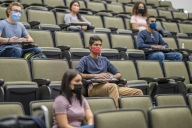You have /5 articles left.
Sign up for a free account or log in.
Workers at the University of Pennsylvania are going to be employed and paid through the semester, COVID-19 or not.
But the same is not true for the contract staff members who may work at Penn but are employed by Bon Appétit, a dining vendor. Those workers are being laid off without pay at the end of the month.
That divide is now playing out all over the country. As dining halls, residences and campus grounds see fewer students, the need for hundreds of employees on campus diminishes. It's true that many universities are offering the employees who can't work better protections and pay than other businesses would. But contract workers often are left out of those commitments.
For a university administration, that may seem logical. Those workers, who feed and clean up after students, are not technically their employees. The outsourcing of these and many other campus services became the norm years ago.
Students and unions, however, have said paying those workers is still the right thing to do.
At Stanford University, directly employed staff have been guaranteed pay, whether they can work or not, until April 15. Jose Escañuela, president of SEIU Local 2007 and himself a Stanford groundskeeper, said some food service employees still are required to come in, but most other units are home with pay.
Janitors at Stanford, though, are not directly employed by the university and are contractors. Those employees, who are part of a different union, are more vulnerable, Escañuela said. A campus group called Students for Workers' Rights has urged the university to extend the salary continuance to contractors.
Harvard University has agreed to pay its dining workers, whose work has been eliminated, for at least 30 days. But the Labor and Employment Law Project at Harvard Law said in a letter that many contract staff are left out of that policy.
John Preston, secretary-treasurer for Teamsters Local 929, which represents the laid-off Penn workers, said the prospects for those employees are not good. Though many go without work over the summer, most have budgeted strictly and were relying on their last 2.5 months of income.
"These employees are neighbors of this university," Preston said. "Unemployment is not going to pay what the university pays. It doesn't make them whole."
Though the union asked Bon Appétit to provide for workers, the company declined. Now the union is asking Penn to step in and pay workers through the vendor.
"They have $10 billion in endowment," Preston said. "They sure could afford to subsidize Bon Appétit and have Bon Appétit pay their employees for the remainder of the semester." The University of Pennsylvania actually has $14 billion in its endowment.
"The vast majority of businesses nationwide, including Bon Appétit have been dramatically impacted by the COVID-19 situation," the university said in a statement to campus. "And, as this crisis is still unfolding, it is unclear what will be required of food service operations in the coming weeks."
Who Can Afford to Pay?
Other universities that may not have the endowments of the aforementioned three institutions may have trouble making commitments to even their direct staff. Quinnipiac University is reducing all salaries in response to the crisis. Employees who make under $50,000 per year will see a 3 percent cut, with all others seeing a 5 percent.
That rule may not always hold true. Santa Clara University is a short drive from Stanford, but it has an endowment about 27 times smaller. For direct staff, the Jesuit college has offered to pay employees until April 30, about two weeks longer than its neighbor.
The question about what will both universities will do after their April commitment dates remains unclear.
In a letter to staff, Santa Clara administration said it could lose $13 million in expected revenue from room and board alone.
"Stanford has the ability more than Santa Clara to recover," said Escañuela, whose union represents workers at both colleges.
A spokesperson for Santa Clara said that after April, the administration hopefully will have a clearer picture of its financial position. In the meantime, the administration is limiting discretionary spending and putting a hiring freeze on noncritical positions.
Workers who have seen their salaries covered by universities have expressed gratitude. Georgetown University has committed to keeping all its contract dining workers paid until the end of the semester. The university is giving Aramark, its vendor, the funds.
Daysi Molina, who works at a cafe on Georgetown's campus, is now able to stay home, as her doctor has instructed her. She's been able to drive her son to his job at Safeway, so he can avoid public transit.
"This is the first time I feel safe," she said.
Sheila Alsbrook, who works in Georgetown's dining hall, said the payment from the university was "a blessing."
"I was just so grateful to know that Georgetown was paying us," she said. "They thought about our safety."
She is in a high-risk group and is staying home, though some of her coworkers have volunteered to keep the dining hall staffed.
"It's important that some of these other colleges pay their employees if the companies they're contracting with say they won't pay us," she said. "We the people should come first."








